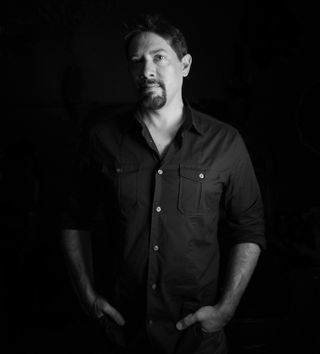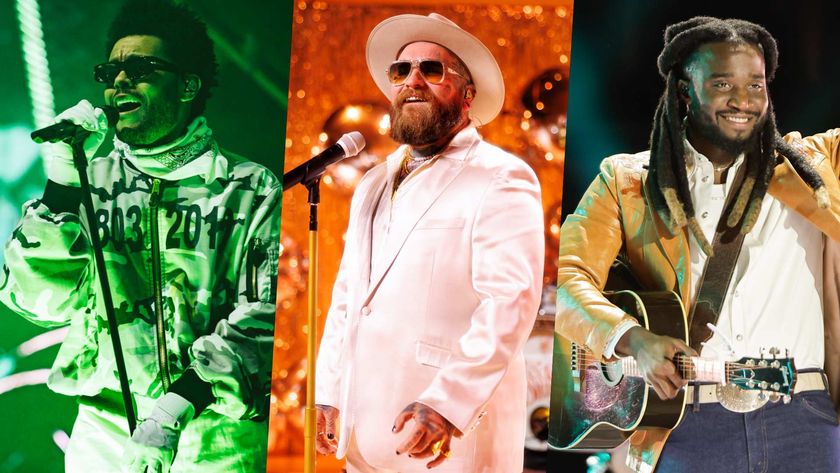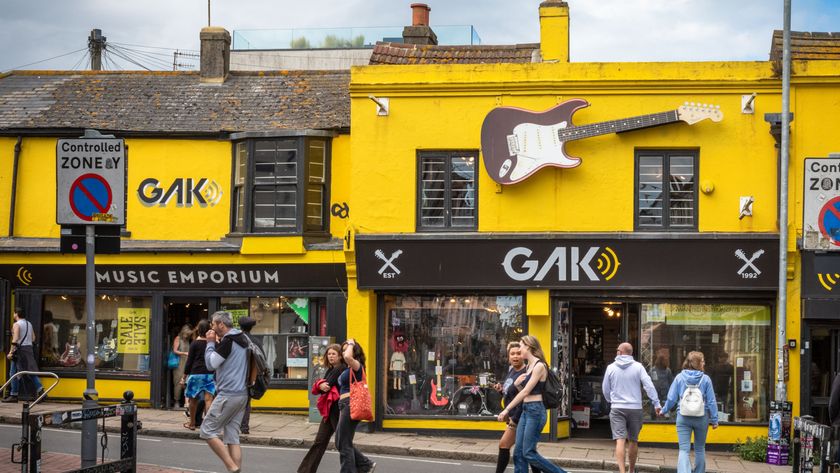So you want to be a... videogames composer: Fortnite, Assassin’s Creed, Borderlands and God of War soundtrack man Cris Velasco - "Be a go-getter, be creative, be cool to be around"
Tips on breaking into music professionally, from people at the top of their field
Cris Velasco is one of the most sought-after composers working today in media, scoring some of the world’s biggest video game franchises including Fortnite, Resident Evil, Overwatch, Bloodborne, Darksiders, Assassin’s Creed, Warhammer, Borderlands, Mass Effect and God of War, and television series such as HULU’s Dimension 404 and Freakish.
For more info and to listen to a wide range of his work, check crisvelasco.com.

What was your musical background prior to getting involved with video game music?
I didn’t grow up musical at all. Around age 16, I discovered guitar and started a death metal band with some friends. A few years later, exploring my options at a local junior college, I took a music appreciation course.
I only had a day to write a Battlestar Galactica demo. My job at the time wouldn’t give me the day off so I quit. I don’t recommend this!
One day we were studying Mozart’s 40th symphony, I had a crazy epiphany and was overwhelmed by the desire to compose. I then studied music full time, applied to a number of schools, and wound up in the music program at UCLA.
It was during this time that I reacquainted myself with games, and discovered that the trend was now focusing on dramatic orchestral works rather than the chiptune scores that I grew up with. I decided to put all my energy towards the game industry at this point.
How did you get your first games work?
I certainly paid my dues! After I graduated from college, it took me nearly seven years to land my first professional game job. I had the opportunity to pitch for a new Battlestar Galactica game. I found out about it late, so I only had a day to write a demo. My job at the time wouldn’t give me the day off so I quit. I don’t recommend this!
Get the MusicRadar Newsletter
Want all the hottest music and gear news, reviews, deals, features and more, direct to your inbox? Sign up here.
I was very familiar with the old TV score, and I wrote a suite inspired by that score. This is unusual, but I actually received a call about 30 minutes after I submitted. The audio director told me they had already hired someone! However, the next day, also very unusual, the same guy called me to say that they actually loved my demo and wanted to hire me for one cinematic.
That turned into more and more work. They finally wound up firing the original composer and hiring me to score the rest of the game.
How does composing music for games differ to composing for film, or television?
For me, one of the biggest differences is time. When I’ve been working on TV shows like Freakish or Dimension 404, the turnaround time is MUCH faster. On Freakish, I was delivering around 20 minutes of music in three days. On a game, depending on its schedule, I might have two months to do the same amount of music.
That’s just the nature of these beasts though. You get used to whatever situation you’re put into. I’ve had games that gave me a full year to write the score. I’ve also had games (Clive Barker’s Jericho) where I needed to write and record two hours of music in under three weeks.
There are of course other technical differences. Linear vs non-linear being the main one. But at the end of the day, I just try to write the best music I can for each project without worrying too much about how the projects differ.
Do you need to be able to read music in order to do the job?
Do you NEED to [read music]? No. Just like you don’t “need” to learn Spanish if you want to live in Spain. But why wouldn’t you?
Do you NEED to? No. Just like you don’t “need” to learn Spanish if you want to live in Spain. But why wouldn’t you?
It enables you to take your craft so much further. Some of the best composition and orchestration training I’ve ever had was from reading scores while listening to the corresponding piece.
It’s inspiring and teaches you so much! There’s no way to do this without reading music. If your goal is to be a professional composer, take the job seriously, and learn to read music.
Gear-wise, what are the essential tools for game music composers?
My studio is equipped with the usual assortment of computers, software, and instruments. I guess an essential tool would be a console (like Xbox or PlayStation) so that you can play games. I think it’s essential to have a love and an understanding for games before you can write for them.
What are some of the common mistakes you see people make when trying to gain work in the industry?
Wanting instant gratification. Everyone’s path is different, but I think they all start out by planting seeds. So go to events, do a lot of networking, make friends, and try to just be cool about it.
Be a go-getter, be creative, be cool to be around.
If you mention you’re a composer, everyone will assume you are looking to work with them. Chances are they’ve been hit up by 20 other composers that day. So set yourself aside from the generic pack by just being a friend first.
My first big gig, God of War, came about because I had made friends with the audio director at Sony. Of course, once you’ve established a rapport with someone, make sure you’ve got the chops to bring a project to completion.
What can budding composers and producers do to increase their chances of gaining employment in games music?
With the thousands of composers all over the world, developers have their pick of any of them. You’ve got the best job in the world, so act like it. Be a go-getter, be creative, be cool to be around.
Finally, which of your projects are you most proud of and why?
I have too many favorites from over the years, but I’ll list a few that instantly come to mind.
Vader Immortal - my whole composing career I’ve put a Star Wars project as the number one spot on my bucket list. To work in this universe was a dream come true for me. I can’t remember ever doing anything as hard or as fun as this one.
Dauntless - I was brought in on this game at the very beginning, and I’ve been composing on it for around four years now. It’s definitely the longest I’ve ever continuously worked on a project. That makes the whole team feel like family now.
The Invisible Hours - this was my first time working with Tequila Works. In terms of gameplay and storytelling, it’s easily the most complex game I’ve ever worked on. So finding the right tone, pacing, and implementation of the music was an extremely fun challenge. And speaking of family, I’ve never felt more respected and cared for than by these guys. They were even at my wedding in Spain!
With thanks to Laced Records, who enabled this series of composer Q&As, featuring some of the most famous and unique talents in the increasingly popular world of game soundtracks.
Laced Records has worked with a range of partners - including Bandai Namco, Bethesda, Capcom, SEGA, and Square-Enix — to release soundtracks for handcrafted indies, classic gaming series and AAA blockbusters. The Laced Records label is part of Keywords Studios, a technical and creative services provider to the video games industry, with 50+ operational studios across 21 countries and four continents.
For more info head to lacedrecords.co
MusicRadar is the number one website for music-makers of all kinds, be they guitarists, drummers, keyboard players, DJs or producers...
- GEAR: We help musicians find the best gear with top-ranking gear round-ups and high-quality, authoritative reviews by a wide team of highly experienced experts.
- TIPS: We also provide tuition, from bite-sized tips to advanced work-outs and guidance from recognised musicians and stars.
- STARS: We talk to musicians and stars about their creative processes, and the nuts and bolts of their gear and technique. We give fans an insight into the craft of music-making that no other music website can.












